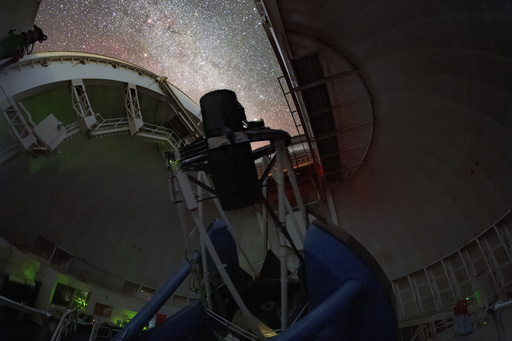
NEW YORK — Recent studies of distant and ancient galaxies are providing new insights that suggest the elusive force known as dark energy may not behave as previously thought. Astronomers have long been aware that the universe is expanding at an accelerating pace, leading to ongoing debates about what mechanism is driving this rapid expansion. The prevailing theory posits the existence of a steady force that aligns with the predominant mathematical framework describing cosmic behavior, but its nature remains shrouded in mystery, leading scientists to label it as dark energy.
This enigmatic substance is believed to constitute nearly 70% of the entire universe, while ordinary matter, encompassing all visible stars, planets, and living beings, accounts for just about 5%. However, findings released earlier this year by a global team comprising over 900 researchers revealed unexpected results. While investigating the movement of galaxies, they discovered that the forces affecting them don’t appear to operate as a constant entity. A new analysis by the same collaborative team has reiterated this surprising conclusion.
“I did not expect to witness such findings in my lifetime,” remarked Mustapha Ishak-Boushaki, a cosmologist from the University of Texas at Dallas and a member of the research group. The research team employed a tool called the Dark Energy Spectroscopic Instrument, which utilizes a telescope situated in Tucson, Arizona. This device generates a three-dimensional presentation of the universe’s history over 11 billion years, enabling scientists to observe the clustering patterns of galaxies throughout time and space. Such mapping offers significant insights into the universe’s evolution and future trajectory.
The emerging map contradicts the assumption that dark energy acts as a constant force, as current theories suggest. Instead, evidence indicates that this energy may fluctuate or diminish over time. If validated, this transformative finding could fundamentally alter astronomers’ established cosmological models, indicating that dark energy could be fundamentally different from existing concepts—or suggesting other unknown phenomena might be at play.
“It’s a thrilling period filled with both excitement and perplexity,” shared Bhuvnesh Jain, a cosmologist at the University of Pennsylvania who is not affiliated with the research. The latest discoveries from this collaboration hint at potential validation of an older hypothesis: that throughout billions of years of cosmic history, the universe’s expansion and galaxy clustering aligned with predictions made by Einstein’s general relativity.
However, the data remains inconclusive. Astronomers affirm that it will require additional observations to challenge a theory that has previously appeared cohesive. Researchers are hopeful that insights from other telescopes and forthcoming analyses over the next few years will clarify whether the understanding of dark energy can withstand scrutiny or if it needs to be revised.
“The importance of this finding is undeniably intriguing,” stated Robert Caldwell, a physicist at Dartmouth College, who is not part of the research team. “However, it wouldn’t be regarded as a definitive breakthrough just yet.” The stakes are high, as dark energy, being the largest component of the universe, plays a critical role in determining its ultimate fate. David Spergel, an astrophysicist and president of the Simons Foundation, explained that if dark energy is stable, the universe would continue to expand, gradually becoming colder and emptier. Conversely, if dark energy increases in strength, it could lead to an extremely rapid expansion, resulting in a catastrophic end termed the Big Rip.
“There’s no need to panic. If these findings hold true, any such catastrophic event wouldn’t occur for billions of years,” he noted. “Nonetheless, it is essential for us to gain a deeper understanding.”

